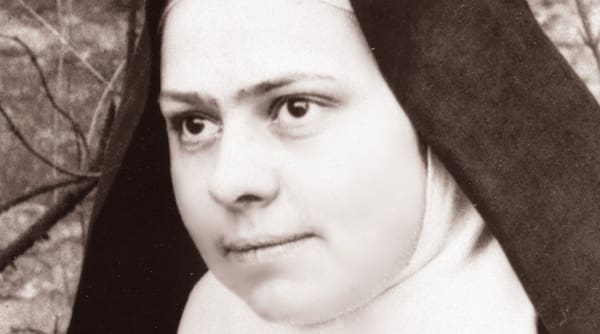Saint Elizabeth of the Trinity (1880 – 1906), a contemporary of St. Thérèse of Lisieux, is a Carmelite mystic from Dijon, France. Her profound theological reflections are given in a tumultuous time, one not unlike our own. The French government had begun to attack religious freedom with the intention of evicting religious orders and confiscating their properties. The local bishop acquiesced to this political pressure, disenfranchising the faithful. In January 1904, she writes to her brother-in-law, a seminarian who is implicated in the fiasco: he and many of his seminary brothers went on strike in protest against the bishop.
 The Mystic of Dijon refers to this turmoil only obliquely but connects with the young seminarian’s zeal for the mission of the Church. Consumed with extending the Risen Lord’s saving work in the world, her focus takes in the hidden but superabundant presence of God. In the face of contention, she counsels contemplation. After asking her seminarian brother-in-law whether “we ever understand how much we are loved” by God, the Carmelite observes that Christ even allows us to share in His life of prayer: “Since the Lord dwells in our hearts, His prayer belongs to us, and I would like to commune with it without cease, placing myself like a little vase at the Headwaters, at the Fountain of Life. With this comes the capacity to communicate this life to souls, the ability to allow its floods of infinite charity to overflow” (Letter 191).
The Mystic of Dijon refers to this turmoil only obliquely but connects with the young seminarian’s zeal for the mission of the Church. Consumed with extending the Risen Lord’s saving work in the world, her focus takes in the hidden but superabundant presence of God. In the face of contention, she counsels contemplation. After asking her seminarian brother-in-law whether “we ever understand how much we are loved” by God, the Carmelite observes that Christ even allows us to share in His life of prayer: “Since the Lord dwells in our hearts, His prayer belongs to us, and I would like to commune with it without cease, placing myself like a little vase at the Headwaters, at the Fountain of Life. With this comes the capacity to communicate this life to souls, the ability to allow its floods of infinite charity to overflow” (Letter 191).
What does it mean to dwell in communion with the prayer of Christ? Christ is the source of living waters and He yearns to make these so drench the soul that they might overflow to the world. Caught in the whirlwinds of falsehood and the cultural power of inhumane ideology, these waters of new life quench our thirst for the truth and for justice. They are the loving waters of mercy, and merciful love alone moistens the soil of humanity parched by sin. It is the truth of divine mercy alone that truly liberates from the tyranny of myth – social or psychological. To help us enter into this mystery further, Saint Elizabeth refers explicitly to the prayer of the Son to the Father “I sanctify myself for them that they may be sanctified by the truth” (John 17:19).
By this prayer, Christ sets Himself apart for the Father so that His followers might be set apart by the truth. When the Lord offered this prayer, He fully saw how the Father’s love for humanity is the only firm ground on which men and women can find their proper footing. It is the truth in the heart of God. The prayer of the Son was accepted by the Father at the price of His own blood. The Holy Spirit teaches this truth through the Body of Christ, the Church in whom the mystery of Christ’s redemptive love extends to the world.
When she indicates her desire to dwell in communion with Christ’s prayer, Saint Elizabeth is rooting herself in this truth that sanctifies the Church with exceeding power. She is assuming an ecclesial identity, identifying herself with the Church as the Bride of Christ. Entrusted with the limitlessness of love and truth exchanged between the Father and the Son, she sees the opportunity not only to live in ceaseless communion with Christ’s prayer but also to help extend its saving power even as the world around her is falling apart.
What Christ prayed before his death and what Saint Elizabeth contemplates in the midst of persecution is not a “smiling” Christianity. When it comes to following in the loving pathway of Christ Crucified, our faith offers no escape from all kinds of personal anguish or social insecurity. Although it frees from the weight of sin and guilt, the love of God revealed in Christ Jesus is no pleasant myth of merely psychological comfort in which we rest. The demand of love to which our consciences are availed cannot be silenced by clever mental gymnastics. Nor does God’s love permit any patronizing gaze on the rest of humanity – for that is not the way He contemplates our misery. On the contrary, our faith takes its stand with Christ on the battlefield of mercy where all that is sacred, noble and true about humanity must be defended, where the definitive victory of good over evil is realized anew.
Here, in the shadow of the Cross, what most defines us is not our failures nor inadequacies nor even apparent powerlessness in the face of psychological and sociological forces. Here, Saint Elizabeth’s vision directs us to the exceeding love of God, a love she contemplates as the overflowing flood of infinite charity into humanity. In the midst of the turmoil of her times, Saint Elizabeth implicates herself in this sanctifying mission of the Church and invites us in the midst of our own personal and social upheavals to do the same.
Note from Dan: Anthony’s fantastic book on prayer, Hidden Mountain Secret Garden, can be found HERE in print, and HERE in Kindle format
+
Art for this post on Charity’s Infinite Overflowing Flood in the Midst of Trial: Photograph of Saint Elizabeth of the Trinity provided by DBurke, used with permission.




